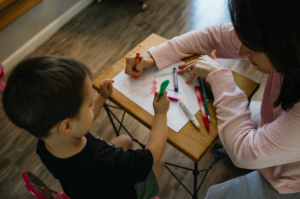As a parent, staying present with your kids cannot be easy. Life moves quickly, and it’s simple to become engrossed in the daily commotion. But being present with your kids is essential for their development and can also help you create a stronger bond with them. Here are seven really easy methods to spend more time with your children.
Put Away Your Phone
It’s easy to get distracted by our phones and devices, but it’s important to put them away when spending time with your kids. Putting away your phone will help you to stay focused on the moment and be more present with your kids.
Listen Intently
Spend some time hearing what your children have to say. Let them know that you respect their viewpoints and are curious about what they have to express. To demonstrate to your children that you are here and paying close attention to them, practice active listening.
Take Time for Fun
Make time for fun activities with your kids. Get outdoors, play board games, or read a book. An excellent method to show your children that they matter to them and that you are there for them is to engage in enjoyable activities together. A simple activity is to read a book together before bed every night. You can even read something as simple as ABC books. Reading can help both of you unwind after a busy day and they will enjoy being there with you.
Go on Adventures
Going on adventures with your kids is a great way to stay present with them. It doesn’t have to be a big adventure, just a trip to the park or a hike in the woods can be enough. Together, exploring new locations and going through new experiences will help your children make lifelong memories.
Ask Questions
Ask your kids questions about their day, thoughts, and feelings. This will demonstrate to them that you’re engaged in their life and value their opinions. To demonstrate to your children that you are there and paying attention to them, ask them questions.
Give Compliments
Compliment your kids often. Let them know you appreciate them and think they are doing a great job. Children will sense your presence and interest when you commend them.
Why is it important to be More Present with Your Kids?
Among the most crucial things for a family to do is to be present with their children. Being present demonstrates to your kids that you value them, are curious about what they have to share, and are available to help them succeed.
Being present also helps you to stay connected with your children and to keep track of their lives. It lets you stay informed about their activities, interests, and needs. You can then provide the appropriate guidance and support to ensure that they make healthy choices and take the right steps to reach their goals.
One excellent method to enjoy spending time with your children is to be present with them. You can talk, laugh, and have fun together while building the foundations of a strong, lasting relationship. It is a great way to bond with your children and create a positive, nurturing environment for them to grow and thrive.
Why do Your Kids Need Your Attention?
Children need their parent’s attention to develop healthy relationships, learn important social skills, and gain self-confidence. When parents give their children attention, they show them that they care and that their feelings and needs matter. This strengthens the relationship between both the parent and the kid by fostering trust.
Children also require care to acquire the ability to properly communicate with others. When children are listened to, they learn how to communicate effectively and develop their ability to understand the feelings of others.
Conclusion
Being present with your kids doesn’t have to be complicated. By making small changes to your daily routine and actively investing your time and attention in your children, you can build a stronger bond and a more meaningful relationship with them. Make it a priority to practice these seven super simple ways to be more present with your kids, and you’ll be on your way to a more fulfilling and rewarding parent-child relationship.


